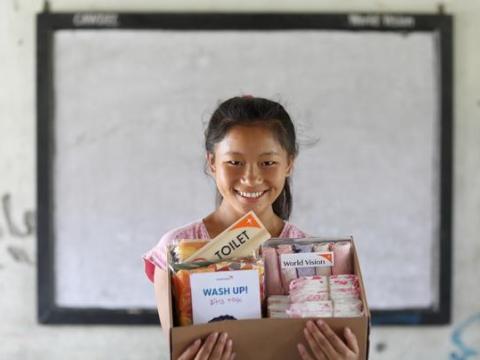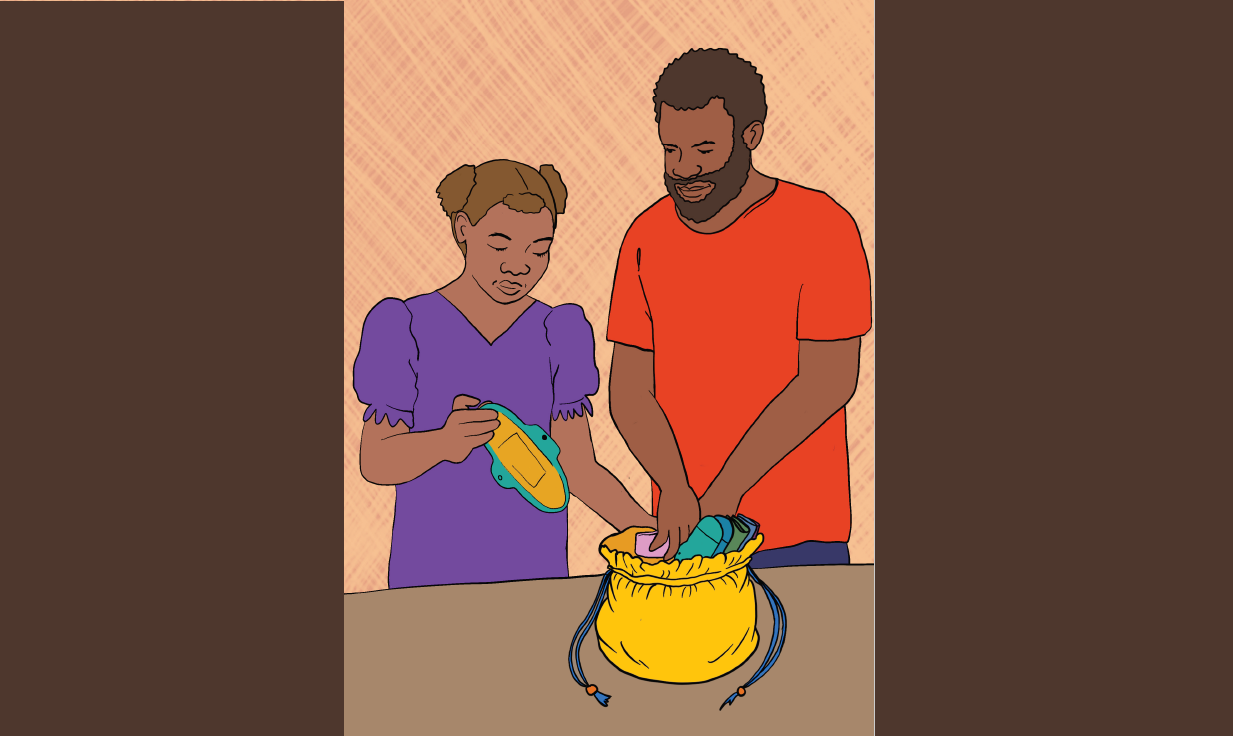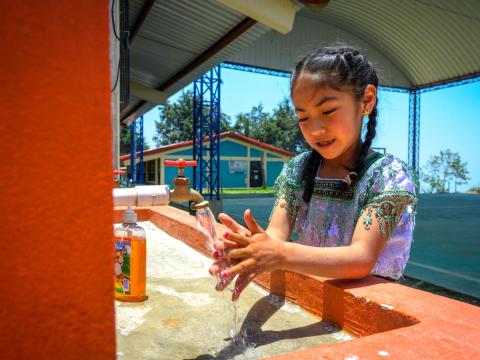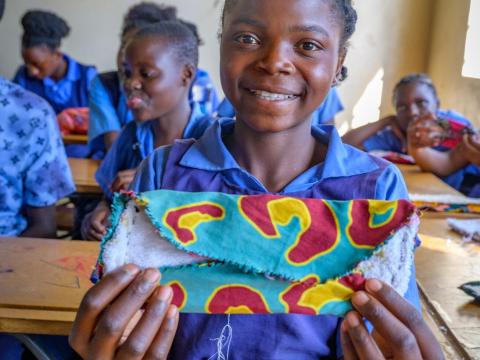
Menstrual Health in retrospect – A decade of lessons learned
Ten years after the first Menstrual Hygiene Day, World Vision reflects on significant progress in menstrual health and hygiene and outlines key lessons and aspirations for the future.
It has been 10 years since the first Menstrual Hygiene Day. It is a good time to take stock of where we have been and consider where we want to go.
When I joined the WASH (water, sanitation and hygiene) team at World Vision in 2012, menstrual hygiene management was in the shadows. Menstrual hygiene management began to gain visibility at World Vision in 2014 with a publication on the perceptions and barriers to menstrual hygiene management in Zambia by then-PhD candidate, Cara Person, in partnership with Dr. Emmanuel Opong.
For the next several years, much of World Vision’s focus was on the management side of menstrual hygiene, emphasising toilets and access to menstrual pads – things that are easy to track and to count. We cannot advance menstrual health and hygiene without those things, and yet alone they are not enough to drive transformation in menstrual health – which includes broader aspects of equity and well-being. At World Vision, this shift to a more comprehensive focus on menstrual health and hygiene (beyond management only) has involved equipping staff, developing curricula to address knowledge and stigma, and advocating for stronger government policies.
Joining me in this reflection are three menstrual health champions from World Vision’s WASH programs worldwide – Wanjiku Kuria, Sanitation and Hygiene Advisor from Kenya; Nobuhle Mlotshwa, WASH Coordinator from Zimbabwe; and Khalil Hamad, WASH & Climate Resilience Technical Advisor from Iraq. Based on collective experience, we are highlighting four key lessons that are important to driving forward progress in menstrual health and hygiene:
Lesson 1: We must believe it first.
For menstrual health and hygiene to advance, practitioners must first be convinced it is important. In Kenya, Wanjiku Kuria witnessed this firsthand, noting the importance of staff – especially male staff – becoming knowledgeable champions for menstrual health and hygiene. She notes that an intensive focus on capacity building among staff through World Vision’s Global Health and WASH Certificate programme, in partnership with Drexel University, has played a prominent role in de-mystifying menstrual health, especially amongst male staff. The programme includes a unit focusing on menstrual health on which Wanjiku herself frequently lectures. From this experience, she has seen an increasing number of male staff particularly emphasising the importance of understanding and addressing menstrual health and hygiene in our programs and seeking to expand their own knowledge.
In honour of Menstrual Hygeine Day, Wanjiku was interviewed on a national morning news programme in Kenya. You can watch her interview via here
Lesson 2: Equip and educate boys as allies.
In programmes that aim to support girls in menstrual health and hygiene, boys are important allies. Nobuhle Mlotshwa from Zimbabwe shares that, over the past decade, menstrual health and hygiene in Zimbabwe have shifted from solely providing menstrual hygiene kits to educating girls and boys about puberty and menstruation, addressing unanswered questions and taboos. With funding from Dubai Cares and in partnership with Sesame Workshop, the WASH UP! Girl Talk curriculum was created and launched in Zimbabwe in 2018. This curriculum included 10 sessions for girls and five for boys around puberty and menstruation. One key learning from that first iteration was that boys were eager to learn and participate more.

We are now working with Sesame Workshop to revise and expand this curriculum in four new countries – Kenya, Honduras, Guatemala and El Salvador, with significant updates in Zimbabwe as well. This iteration of the curriculum is more comprehensive, including more robust information for girls and expanded content for boys.
Lesson 3: Menstrual health requires a systems-based approach
In Iraq, as a conservative context with deeply held religious beliefs, sensitive topics like menstrual health must be addressed with consideration of the system, which includes the network of stakeholders who can either help or hinder progress. Khalil Hamad relates that, starting in 2019, World Vision Iraq worked with the Ministry of Health to engage the topic of menstrual health and hygiene. They developed culturally appropriate menstrual health and hygiene materials, trained teachers, and engaged in menstrual health and hygiene education within schools. Starting in 2021, they expanded beyond schools to households and communities. Partnering with Days for Girls International, they trained female hygiene promoters to carry messages door to door. This work was accompanied by efforts to build menstrual hygiene management facilities in schools and healthcare centers. All of these efforts have worked together collectively to advance the cause of menstrual health and hygiene in Iraq.

Lesson 4: Intersectionality is important
We must consider intersecting issues to advance menstrual health and hygiene for all people, especially the most vulnerable. In Vanuatu, an innovative project called the Veivanua Campaign, led by Jane Wilbur from London School of Hygiene and Tropical Medicine, together with World Vision Vanuatu, focused on menstrual health behavior change interventions for women and girls with intellectual disabilities and their caregivers in humanitarian responses. When issues like disability and living in a fragile context intersect with gender-related challenges, additional support is especially critical. This campaign showed strong results and demonstrates the importance of thinking more deeply and broadly around the various needs of people who menstruate.

As we celebrate how far we have come, let’s also ask ourselves what we want to celebrate ten years from now, on May 28, 2034. For myself and my colleagues, we hope to celebrate the following:
- Menstrual health is declared as a human right in the International Covenant on Economic, Social and Cultural Rights and the Convention on the Elimination of Discrimination Against Women
- Zero stigma related to menstrual health
- Affordable and available menstrual hygiene management products for all girls/women of reproductive age
- More funders have stepped up to advance research and programming in menstrual health
- We see an increase in viable, environmentally friendly solutions for menstrual hygiene waste disposal that are appropriate to the setting
If we can accomplish these aims in the next ten years, it will take individual ownership and engaged allies and partners. It will require systems thinking and deep consideration of intersecting challenges. We have a strong foundation upon which we can build, and if we keep moving forward together, we will see a more #periodfriendlyworld.
About the authors:
Wanjiku Kuria is the Sanitation and Hygiene Advisor for World Vision Kenya. She has almost 20 years of experience in the WASH sector, in both refugee and development contexts. She just presented on menstrual health on national television in Kenya.
Nobuhle Mlotshwa is a WASH Coordinator with World Vision Zimbabwe, with close to ten years of experience with World Vision. She leads the Strong Women Strong World: Beyond Access project in Zimbabwe, which focuses on the empowerment of women and girls through integrated WASH and economic empowerment interventions.
Khalil Hamad is the WASH and Climate Resilience Technical Advisor for World Vision Iraq, serving in this role for almost 8 years. He is an advocate and leader for gender and disability inclusion in WASH programmes in Iraq.
Kristie Urich is a WASH Technical Director with World Vision United States. In her role, she focuses on gender equality and social inclusion in WASH and is a longtime advocate for menstrual health and hygiene inclusion in World Vision programmes.


